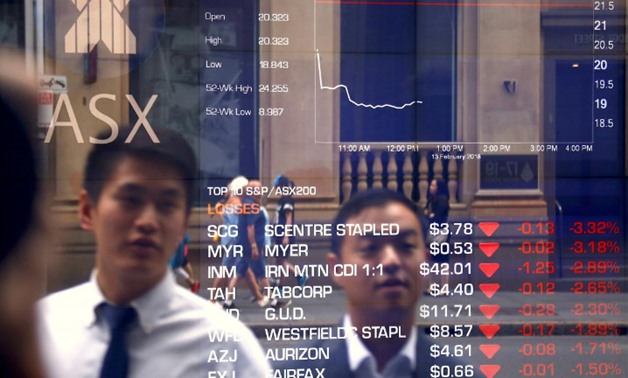
Pedestrians are reflected in a window displaying stock prices at the Australian Securities Exchange (ASX) in Sydney, Australia, February 13, 2018. REUTERS/David Gray
TOKYO - 13 February 2018: Asian stocks pulled further away from two-month lows on Tuesday, lifted by Wall Street’s extended rebound from last week’s steep fall, but investors remained cautious ahead of U.S. inflation data later in the week.
Spreadbetters expected a higher open for European equities, forecasting 0.25 percent gains for Britain’s FTSE and 0.3 percent for Germany’s DAX and France’s CAC.
MSCI’s broadest index of Asia-Pacific shares outside Japan was up 1.1 percent after sliding to its lowest level since Dec. 11 on Friday.
Australian stocks rose 0.6 percent and South Korea’s KOSPI climbed 0.65 percent. Japan’s Nikkei started higher but lost steam to slip 0.75 percent.
The Shanghai Composite Index was 1 percent higher, buoyed by global gains and suggestions of possible Chinese government support.
An affiliate of China’s securities regulator on Monday encouraged major shareholders of domestically-listed firms to increase their holdings after last week’s global selloff mauled Chinese stocks.
Wall Street’s three major indexes rose for the second day on Monday as investors regained some confidence after U.S. equities had their biggest weekly drop in two years.
Still, caution lingered in the broader markets following the U.S.-led tumble in riskier assets last week and ahead of U.S. inflation data on Wednesday. A stronger-than-expected reading on price pressures could trigger a fresh wave of selling.
“It is hard at this stage to tell if the U.S. markets have bottomed out, considering that bets against the dollar still remain significant,” said Kota Hirayama, senior emerging markets economist at SMBC Nikko Securities in Tokyo.
“On the other hand, attempts by investors to pull money out of the emerging markets during last week’s turmoil appeared to have been unexpectedly limited, so that is an encouraging sign.”
Wednesday’s U.S. inflation data will be watched closely by jittery markets.
“The consumer prices numbers bear close watching as if it shows a strong rise, that could rattle U.S. long-term yields and impact equities negatively,” said Koji Fukaya, president of FPG Securities in Tokyo.
The 10-year Treasury note yield edged back to 2.849 percent after rising to a four-year peak of 2.902 percent on Monday.
The dollar index against a basket of six major currencies extended modest losses suffered overnight and dipped 0.25 percent to 89.987. The index edged back from a two-week high of 90.567 scaled late last week, when it had benefited as a safe haven in the wake of the global market selloff.
The greenback lost 0.3 percent to 108.285 yen, weighed by the sagging Nikkei. The euro added 0.15 percent to $1.2310.
The South African rand was little changed at 11.91 per dollar after slipping briefly following news that the country’s ruling party African National Congress had opted to sack President Jacob Zuma.
The rand had risen 2 percent over the past two days, helped by hopes that Zuma would step down, but ran into resistance as the latest news was seen potentially prolonging the political standoff.
The Australian dollar was steady at $0.7866 after rising about 0.6 percent overnight on the back of higher commodity prices and improvement in broader risk sentiment.
Copper prices also bounced further away from two-month lows as more stable global markets encouraged investors to return to commodities.
Copper on the London Metal Exchange extended an overnight rally to trade 1.4 percent higher at $6,927.00 per tonne.
Commodities were also supported by the dollar’s pullback from two-week highs. A lower greenback favors non-U.S. buyers by reducing the price of dollar-denominated commodities.
Brent crude rose 0.55 percent to $62.94 per barrel.
Spot gold was 0.3 percent higher at $1.326.51 an ounce.

Comments
Leave a Comment